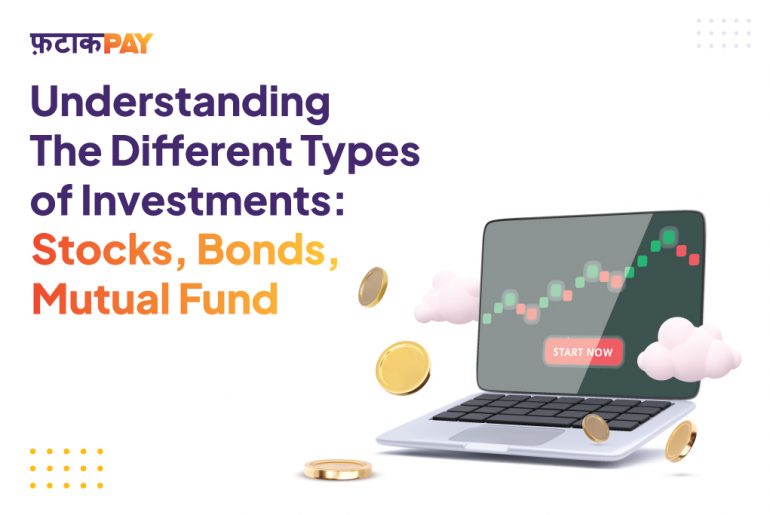It is often said that don’t put your eggs in a single basket. People usually interpret this statement as ‘not putting money in a single stock’. That interpretation is not entirely wrong, however, it does miss a crucial point. A better interpretation of this statement is that don’t put your money entirely in the stock market but diversify your money across different avenues. Understanding the various types of investments available helps reduce risk and build long-term wealth.
Let’s have a look at the different types of investment avenues.
What are bonds?
A bond is when an investor loans money to an entity for a defined period of time, at a fixed or variable interest rate. If you are buying the bond, you are the person who is loaning the money, and if you are issuing a bond, then you are the entity that is receiving those bond proceeds to finance a certain venture and when you are in the marketplace as a consumer, two of the things that can help determine the terms that you’re offered is
- The length of time your money is going to be tied up
- The credit quality of the entity to which you’re lending the money.
For example, if you are buying an Indian Government bond, it is highly unlikely that the Indian government is going to default on the loan. Since Government bonds are low-risk, you can’t expect a high return on your investment.
Conversely, if you lend money to an entity that is not stable, you might expect a higher rate of return to compensate you for that additional risk.
With bonds, you have the possibility of earning more than fixed deposits. Unlike stocks, bonds give you a guaranteed rate of return (albeit a lower rate of return than stocks).
The tenure of a bond can be 3 years, 5 years, 10 years and so on.
Interest on bonds is paid to you on fixed dates called coupon payment dates. It can be paid semi-annually, or annually. There is also the date of redemption, which is the scheduled maturity date for the company to repay you the funds. The redemption value of a bond can be at par (the money you invested), at a premium (more than the money you invested), or at a discount (less than the money you invested). To save money on taxes, one can invest in tax-free bonds.
What is stocks
When you buy stocks, instead of loaning money, you are instead purchasing ownership in a company, by acquiring shares.
Let’s say I have a company that’s worth Rs.1000. I issue 10 shares of stock at Rs.100 apiece. If you Invest Rs.500, you can buy 50% of my shares i.e 5 shares. If the value of my organisation goes to Rs.2000 then the value of your shares would double, even though you haven’t purchased more of them. If the value of my company goes down, so does the value of your shares. This is how people make or lose money when purchasing stocks.
Stocks are issued in perpetuity, whereas bonds have a fixed tenure. Income in stocks can also be earned in the form of dividends.
To check the returns of Sensex for the past 13 years, do check out our previous blog:
https://fatakpay.com/blog/need-for-financial-security-in-todays-inflation-recession-economy/
What is Mutual funds
Lastly, we have mutual funds. Unlike stocks and bonds, you are putting money into a pool and that money is invested in a basket of securities and those securities could include stocks and bonds. Some mutual funds are professionally managed and others are looking to find a certain sector or an index which they closely track. People invest in mutual funds to diversify their investments because, unlike a single stock or bond where you’re loaning or buying into one entity, a mutual fund could have dozens of stocks and bonds, which will hopefully spread out your risk. A mutual fund can invest in equity, debt, or both. In simple words, a mutual fund collects money from multiple investors and invests it across different instruments. With mutual funds, income can be earned in the form of interest, dividends, or capital gains.
For investors who prefer stability or hedging against market volatility, some also choose to invest in gold alongside mutual funds and equities as part of a balanced portfolio.
Few pointers worth noting:
It is difficult to figure out which mutual fund is right for you, so to help with that they issue a prospectus. The prospectus is the document that tells you the managing fees that are in that investment, the holdings that are there in that investment, and the philosophy of that fund so you can decide whether it’s a fit or else you keep looking for better alternatives.
When you invest in stocks, you have the autonomy to choose which stocks you want to invest in, and at the volume of stocks you want to invest in. However, if you are not keen on doing your stock market research, it is advisable to invest in a mutual fund, as it is run by a professional portfolio manager. The selection of stocks is thus done by the portfolio manager.
In conclusion, as per your risk appetite, do explore the various types of investment options available to you. We hope this blog was a great value addition to your existing body of knowledge.
| Personal Loans by City | ||||
|---|---|---|---|---|
| Personal Loan Bengaluru | Personal Loan Thane | Personal Loan Mumbai | Personal Loan Hyderabad | |
| Personal Loan Pune | Personal Loan Surat | Personal Loan Coimbatore | Personal Loan Delhi | |
| Personal Loans by Amount | ₹60,000 Personal Loan | ₹3 Lakh Personal Loan | ₹5 Lakh Personal Loan |
|---|






